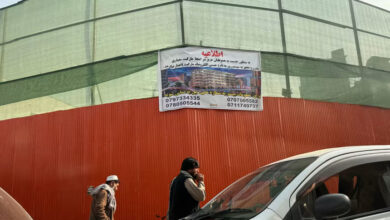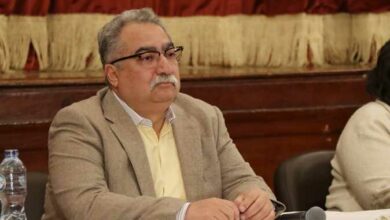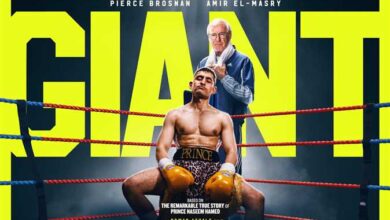In all of Khaled el-Sawy’s roles he makes an impact. Even if the part is small, the actor enchants both the audience and the critics. So it was not a surprise when el-Sawy was awarded best actor for his role in the movie The Wedding.
El-Sawy is currently shooting a movie titled Apology, for Adults Only and the TV series People of Cairo.
Al-Masry Al-Youm: After you have acted in leading roles, why did you agree to making the film Apology, for Adults Only, in which you don’t have a lead role, and on which you are working with a young director?
Khaled el-Sawy: I found it to be a very good and important movie, and the script is written well by Bashir Aldeek, so I was persuaded to accept the film and the role. What made me more eager about the part was when I met with the director and I found that he has an artistic point of view and good vision. The cast is also excellent, with Amr Saad, Zeina and Mahmoud Abdel Moghny. And the production is very good.
In my view, any film is made up of different components, such as the script, the production, the directing, and the actors. I believe that this film has all these components, and just because I have played lead roles in cinema and TV doesn’t mean that I would refuse other smaller, but important roles. What matters the most for me is to play effective and important roles. An important role is better than a dozen unimportant lead roles.
Al-Masry: You are preparing for a film about the biography of Ahmed Fouad Negm. What are the details?
El-Sawy: Indeed, there is a film project between myself and director Essam el-Shamaa about Ahmed Fouad Negm, but we agreed that we should not talk about it or its details, because it’s planned to be a big surprise. I don’t like to talk about any role I am preparing myself for. I prefer that people watch it when it comes out in the theaters, and I hope that the outcome will be good.
Al-Masry: Recently you were awarded the Catholic Center prize for best lead role in The Wedding. Do you think that prizes are an indicator that you have made good choices?
El-Sawy: Of course, awards satisfy any artist and make him believe that he is on the right way, especially if the honor comes from the audience rather than from critics, and that’s what happened with The Wedding. But honestly I do not think about prizes and awards. I don’t accept a role in a movie just because I think it will win prizes.
Al-Masry: Why did you take part in the film Adrenaline, even though it’s a risky film and not expected to make it at the box office?
El-Sawy: That film is a special project and I liked it very much. I liked its idea and its execution, and I don’t hesitate when I have the chance to make a film where I see an artistic challenge. From the start I knew that this film would be different from the usual movies showing in the theaters and that it might not be a big hit at the box office. But in general, I don’t look at the box office or the profits and I don’t look from a commercial perspective. What matters to me is to make a good film that has artistic content, and so it becomes successful and makes a profit for the producer–but I do not chase after commercial profit and make cliché films just because I think they will be successful.
Al-Masry: So did you take your decision not to work on formulaic or cliché films after the movies Cabaret and The Wedding
El-Sawy: I admit that I stopped making this kind of film three years ago, specifically when I had carved out my name and when I had my audience and fans.
Al-Masry: Do you prefer to work in important movies or in popular movies.
El-Sawy: I am considered to have bridged the two. I have successful films on both sides like The Island, The Yacoubian Building, and The Wedding. I am concerned to strike a balance between what is popular and what is artistic, but I don’t deny that at some point I would be very enthusiastic to make an experimental movie or an art movie.
Al-Masry: You are known for your courage and for being very brave in choosing your roles. But now that you have played leading roles, will you change your track and become more conservative?
Elsawy: On the contrary, I don’t do anything except what I believe in. If I am convinced by "hot" scenes I’ll do them without hesitation. I have no red lines, because the end justifies the means in art. I could make a very brave film, full of hot scenes, if it has a moral and a message. On the contrary I would never make what they call a “clean movie” which has destructive or filthy concepts–like for example the idea that women are created for sex, or a movie which calls on you to hate your country because it did not give you anything, or one which glorifies injustice because the world is now ruled by evil. I can never perform in a movie, no matter how artistically outstanding, if it has ideas like that.
Al-Masry: But does the prospect of a "hot scene" make the artist feel panicked?
Elsawy: The audience are innocent of such accusations, or they would have executed me when I played the role of the homosexual in The Yacoubian Building. But I am sorry to say that our artistic culture is deeply shaken because of the tastes that have been imposed on us from some Arabic institutions that are involved in cinema production and trying to reshape our general point of view. Unfortunately we are trapped by Arab cultures that are against art and against Egyptian cinema.
Translated from the Arabic Edition.




